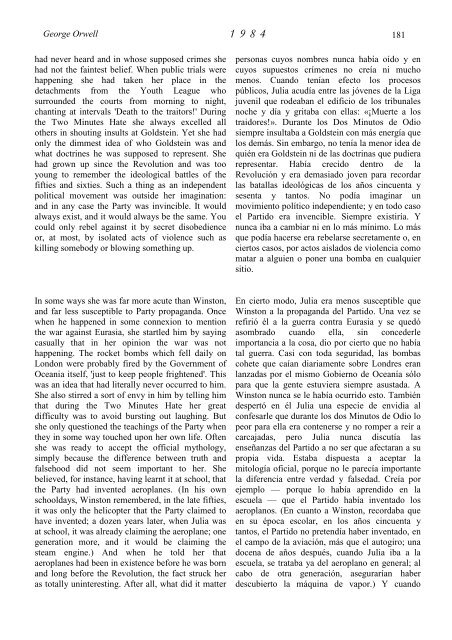Create successful ePaper yourself
Turn your PDF publications into a flip-book with our unique Google optimized e-Paper software.
George Orwell 1 9 8 4<br />
had never heard and in whose supposed crimes she<br />
had not the faintest belief. When public trials were<br />
happening she had taken her place in the<br />
detachments from the Youth League who<br />
surrounded the courts from morning to night,<br />
chanting at intervals 'Death to the traitors!' During<br />
the Two Minutes Hate she always excelled all<br />
others in shouting insults at Goldstein. Yet she had<br />
only the dimmest idea of who Goldstein was and<br />
what doctrines he was supposed to represent. She<br />
had grown up since the Revolution and was too<br />
young to remember the ideological battles of the<br />
fifties and sixties. Such a thing as an independent<br />
political movement was outside her imagination:<br />
and in any case the Party was invincible. It would<br />
always exist, and it would always be the same. You<br />
could only rebel against it by secret disobedience<br />
or, at most, by isolated acts of violence such as<br />
killing somebody or blowing something up.<br />
In some ways she was far more acute than Winston,<br />
and far less susceptible to Party propaganda. Once<br />
when he happened in some connexion to mention<br />
the war against Eurasia, she startled him by saying<br />
casually that in her opinion the war was not<br />
happening. The rocket bombs which fell daily on<br />
London were probably fired by the Government of<br />
Oceania itself, 'just to keep people frightened'. This<br />
was an idea that had literally never occurred to him.<br />
She also stirred a sort of envy in him by telling him<br />
that during the Two Minutes Hate her great<br />
difficulty was to avoid bursting out laughing. But<br />
she only questioned the teachings of the Party when<br />
they in some way touched upon her own life. Often<br />
she was ready to accept the official mythology,<br />
simply because the difference between truth and<br />
falsehood did not seem important to her. She<br />
believed, for instance, having learnt it at school, that<br />
the Party had invented aeroplanes. (In his own<br />
schooldays, Winston remembered, in the late fifties,<br />
it was only the helicopter that the Party claimed to<br />
have invented; a dozen years later, when Julia was<br />
at school, it was already claiming the aeroplane; one<br />
generation more, and it would be claiming the<br />
steam engine.) And when he told her that<br />
aeroplanes had been in existence before he was born<br />
and long before the Revolution, the fact struck her<br />
as totally uninteresting. After all, what did it matter<br />
181<br />
personas cuyos nombres nunca había oído y en<br />
cuyos supuestos crímenes no creía ni mucho<br />
menos. Cuando tenían efecto los procesos<br />
públicos, Julia acudía entre las jóvenes de la Liga<br />
juvenil que rodeaban el edificio de los tribunales<br />
noche y día y gritaba con ellas: «¡Muerte a los<br />
traidores!». Durante los Dos Minutos de Odio<br />
siempre insultaba a Goldstein con más energía que<br />
los demás. Sin embargo, no tenía la menor idea de<br />
quién era Goldstein ni de las doctrinas que pudiera<br />
representar. Había crecido dentro de la<br />
Revolución y era demasiado joven para recordar<br />
las batallas ideológicas de los años cincuenta y<br />
sesenta y tantos. No podía imaginar un<br />
movimiento político independiente; y en todo caso<br />
el Partido era invencible. Siempre existiría. Y<br />
nunca iba a cambiar ni en lo más mínimo. Lo más<br />
que podía hacerse era rebelarse secretamente o, en<br />
ciertos casos, por actos aislados de violencia como<br />
matar a alguien o poner una bomba en cualquier<br />
sitio.<br />
En cierto modo, Julia era menos susceptible que<br />
Winston a la propaganda del Partido. Una vez se<br />
refirió él a la guerra contra Eurasia y se quedó<br />
asombrado cuando ella, sin concederle<br />
importancia a la cosa, dio por cierto que no había<br />
tal guerra. Casi con toda seguridad, las bombas<br />
cohete que caían diariamente sobre Londres eran<br />
lanzadas por el mismo Gobierno de Oceanía sólo<br />
para que la gente estuviera siempre asustada. A<br />
Winston nunca se le había ocurrido esto. También<br />
despertó en él Julia una especie de envidia al<br />
confesarle que durante los dos Minutos de Odio lo<br />
peor para ella era contenerse y no romper a reír a<br />
carcajadas, pero Julia nunca discutía las<br />
enseñanzas del Partido a no ser que afectaran a su<br />
propia vida. Estaba dispuesta a aceptar la<br />
mitología oficial, porque no le parecía importante<br />
la diferencia entre verdad y falsedad. Creía por<br />
ejemplo — porque lo había aprendido en la<br />
escuela — que el Partido había inventado los<br />
aeroplanos. (En cuanto a Winston, recordaba que<br />
en su época escolar, en los años cincuenta y<br />
tantos, el Partido no pretendía haber inventado, en<br />
el campo de la aviación, más que el autogiro; una<br />
docena de años después, cuando Julia iba a la<br />
escuela, se trataba ya del aeroplano en general; al<br />
cabo de otra generación, asegurarían haber<br />
descubierto la máquina de vapor.) Y cuando


